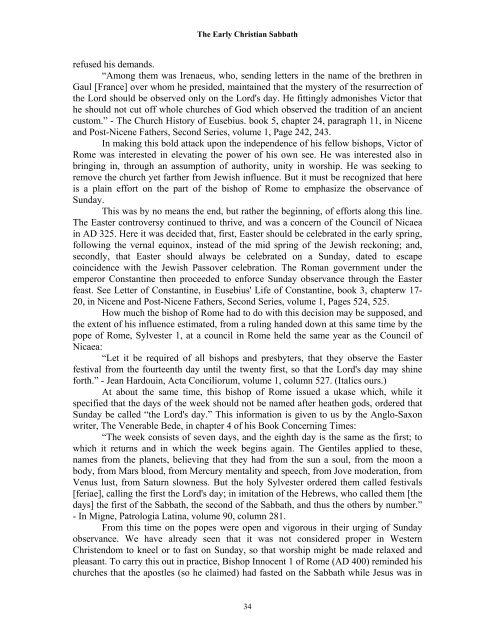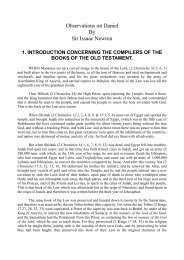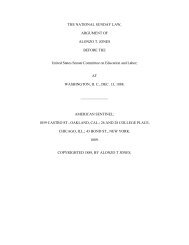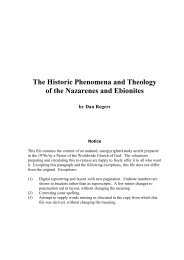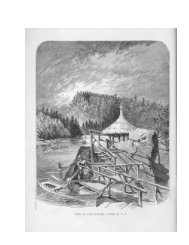THE EARLY CHRISTIAN SABBATH - Friends of the Sabbath Australia
THE EARLY CHRISTIAN SABBATH - Friends of the Sabbath Australia
THE EARLY CHRISTIAN SABBATH - Friends of the Sabbath Australia
Create successful ePaper yourself
Turn your PDF publications into a flip-book with our unique Google optimized e-Paper software.
The Early Christian <strong>Sabbath</strong><br />
refused his demands.<br />
“Among <strong>the</strong>m was Irenaeus, who, sending letters in <strong>the</strong> name <strong>of</strong> <strong>the</strong> brethren in<br />
Gaul [France] over whom he presided, maintained that <strong>the</strong> mystery <strong>of</strong> <strong>the</strong> resurrection <strong>of</strong><br />
<strong>the</strong> Lord should be observed only on <strong>the</strong> Lord's day. He fittingly admonishes Victor that<br />
he should not cut <strong>of</strong>f whole churches <strong>of</strong> God which observed <strong>the</strong> tradition <strong>of</strong> an ancient<br />
custom.” - The Church History <strong>of</strong> Eusebius. book 5, chapter 24, paragraph 11, in Nicene<br />
and Post-Nicene Fa<strong>the</strong>rs, Second Series, volume 1, Page 242, 243.<br />
In making this bold attack upon <strong>the</strong> independence <strong>of</strong> his fellow bishops, Victor <strong>of</strong><br />
Rome was interested in elevating <strong>the</strong> power <strong>of</strong> his own see. He was interested also in<br />
bringing in, through an assumption <strong>of</strong> authority, unity in worship. He was seeking to<br />
remove <strong>the</strong> church yet far<strong>the</strong>r from Jewish influence. But it must be recognized that here<br />
is a plain effort on <strong>the</strong> part <strong>of</strong> <strong>the</strong> bishop <strong>of</strong> Rome to emphasize <strong>the</strong> observance <strong>of</strong><br />
Sunday.<br />
This was by no means <strong>the</strong> end, but ra<strong>the</strong>r <strong>the</strong> beginning, <strong>of</strong> efforts along this line.<br />
The Easter controversy continued to thrive, and was a concern <strong>of</strong> <strong>the</strong> Council <strong>of</strong> Nicaea<br />
in AD 325. Here it was decided that, first, Easter should be celebrated in <strong>the</strong> early spring,<br />
following <strong>the</strong> vernal equinox, instead <strong>of</strong> <strong>the</strong> mid spring <strong>of</strong> <strong>the</strong> Jewish reckoning; and,<br />
secondly, that Easter should always be celebrated on a Sunday, dated to escape<br />
coincidence with <strong>the</strong> Jewish Passover celebration. The Roman government under <strong>the</strong><br />
emperor Constantine <strong>the</strong>n proceeded to enforce Sunday observance through <strong>the</strong> Easter<br />
feast. See Letter <strong>of</strong> Constantine, in Eusebius' Life <strong>of</strong> Constantine, book 3, chapterw 17-<br />
20, in Nicene and Post-Nicene Fa<strong>the</strong>rs, Second Series, volume 1, Pages 524, 525.<br />
How much <strong>the</strong> bishop <strong>of</strong> Rome had to do with this decision may be supposed, and<br />
<strong>the</strong> extent <strong>of</strong> his influence estimated, from a ruling handed down at this same time by <strong>the</strong><br />
pope <strong>of</strong> Rome, Sylvester 1, at a council in Rome held <strong>the</strong> same year as <strong>the</strong> Council <strong>of</strong><br />
Nicaea:<br />
“Let it be required <strong>of</strong> all bishops and presbyters, that <strong>the</strong>y observe <strong>the</strong> Easter<br />
festival from <strong>the</strong> fourteenth day until <strong>the</strong> twenty first, so that <strong>the</strong> Lord's day may shine<br />
forth.” - Jean Hardouin, Acta Conciliorum, volume 1, column 527. (Italics ours.)<br />
At about <strong>the</strong> same time, this bishop <strong>of</strong> Rome issued a ukase which, while it<br />
specified that <strong>the</strong> days <strong>of</strong> <strong>the</strong> week should not be named after hea<strong>the</strong>n gods, ordered that<br />
Sunday be called “<strong>the</strong> Lord's day.” This information is given to us by <strong>the</strong> Anglo-Saxon<br />
writer, The Venerable Bede, in chapter 4 <strong>of</strong> his Book Concerning Times:<br />
“The week consists <strong>of</strong> seven days, and <strong>the</strong> eighth day is <strong>the</strong> same as <strong>the</strong> first; to<br />
which it returns and in which <strong>the</strong> week begins again. The Gentiles applied to <strong>the</strong>se,<br />
names from <strong>the</strong> planets, believing that <strong>the</strong>y had from <strong>the</strong> sun a soul, from <strong>the</strong> moon a<br />
body, from Mars blood, from Mercury mentality and speech, from Jove moderation, from<br />
Venus lust, from Saturn slowness. But <strong>the</strong> holy Sylvester ordered <strong>the</strong>m called festivals<br />
[feriae], calling <strong>the</strong> first <strong>the</strong> Lord's day; in imitation <strong>of</strong> <strong>the</strong> Hebrews, who called <strong>the</strong>m [<strong>the</strong><br />
days] <strong>the</strong> first <strong>of</strong> <strong>the</strong> <strong>Sabbath</strong>, <strong>the</strong> second <strong>of</strong> <strong>the</strong> <strong>Sabbath</strong>, and thus <strong>the</strong> o<strong>the</strong>rs by number.”<br />
- In Migne, Patrologia Latina, volume 90, column 281.<br />
From this time on <strong>the</strong> popes were open and vigorous in <strong>the</strong>ir urging <strong>of</strong> Sunday<br />
observance. We have already seen that it was not considered proper in Western<br />
Christendom to kneel or to fast on Sunday, so that worship might be made relaxed and<br />
pleasant. To carry this out in practice, Bishop Innocent 1 <strong>of</strong> Rome (AD 400) reminded his<br />
churches that <strong>the</strong> apostles (so he claimed) had fasted on <strong>the</strong> <strong>Sabbath</strong> while Jesus was in<br />
34


